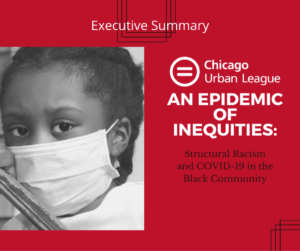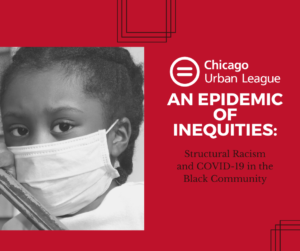Data show that racial inequities make Blacks more likely to get and die from the virus
(CHICAG0, May 11, 2020) – Longstanding structural racism and inequity contribute to a range of risk factors that make Black Americans more likely to contract and die from COVID-19, according to a new report from the Chicago Urban League’s Research & Policy Center.
The report, titled An Epidemic of Inequities: Structural Racism and COVID-19 in the Black Community, notes that while Black people account for just 13% of the national population, they make up about 30% of confirmed cases of the disease caused by the novel coronavirus. In Chicago, which the report uses as a mini case study, Blacks are 30% of the population but account for 60% of COVID-19 deaths. That’s the highest mortality rate of any racial or ethnic group (45 per 100,000).
The report notes that the worst disparities in death rates occurred in states with the most segregated cities, including Illinois, where Blacks are 2.5 times more likely to die from the disease relative to their share of the population. In neighboring Wisconsin, where Blacks make up just 6% of the population, they account for 39% of COVID-19 deaths. Similar disparities exist in Indiana, Michigan, and Missouri.
“Not long after the nation began to report rising numbers of COVID-19 cases, it became apparent that Black communities were among the hardest hit by the virus,” said Chicago Urban League President and CEO Karen Freeman-Wilson. “It is hardly a surprise that the economic and social conditions imposed by more than a century of institutionalized racism have enabled and compounded this disproportionate health impact. The Chicago Urban League is committed to helping ensure that our communities receive the resources and support that will be critical to recovering from this crisis.”
The League will highlight analysis from the report and focus on recovery solutions during its 2020 SUMMIT, scheduled for June 19th. Themed “Bridging the COVID-19 Divide,” the event will be held virtually to help limit the spread of the virus. For more information and to pre-register, visit our 2020 SUMMIT webpage.
Risk Factors that Make Blacks More Likely to Get and Die from COVID-19
The report examines two categories of risk factors: infection risk factors and mortality risk factors. Infection risk factors include:
- Employment and occupational conditions
- Housing
- Barriers to social distancing, and
- Mass incarceration
Mortality risk factors include:
- Hyper-segregation
- Racial discrimination in healthcare
- Poverty, income and wealth
- Environmental contaminants & pollution
- Pre-existing health conditions
“The deaths from COVID-19 and the causes that underlie them are decades in the making,” said Kathie Kane-Willis, Director of Policy and Advocacy for the Chicago Urban League and one of the report co-authors. “Without significant reforms, people of color will continue to disproportionately die of this disease – as they do from many other preventable diseases due to hyper-segregation, lack of access to care and pollution burdens.”
Policy Recommendations
The report also includes 10 short-term policy recommendations to address immediate health needs, along with six longer-term recommendations to improve the social determinants of health for Black Americans.
Short-Term Recommendations:
- COVID-19 case and mortality counts must include demographic data such as race and ethnicity.
- Prioritize racial equity in the proposed Coronavirus Containment Corps.
- Create Strategic Testing and Triage Centers for Vulnerable Groups.
- Allow SNAP beneficiaries to buy groceries online.
- Expand access to Medicaid for people that lost employer-based health insurance.
- Promote COVID-19 isolation facilities.
- Fund grassroots and community-based social service agencies to provide wellness checks.
- Fund faith communities to provide grief counseling and trauma support.
- Continue criminal justice reforms in response to COVID-19 to reduce populations, like eliminating cash bond and reducing people detained or incarcerated.
- Protect Essential workers
- Provide paid sick leave for all essential workers.
- Provide hazard pay for all essential workers.
- Provide personal protective equipment (PPE) for essential workers.
Long-term Recommendations:
- Reinvest in Black communities.
- Reinvest in public health infrastructure.
- Provide healthcare for all.
- Fight for environmental justice and an end to environmental racism.
- End mass incarceration.
- Eradicate the racial wealth gap.
Stephanie Schmitz Bechteler, PhD, Executive Director of the Research and Policy Center and co-author of the report, believes that the recovery process will last much longer for Black communities. “If we look at what happens after major national events, the 2007 housing crisis being a great example, we can predict that Black households and communities will feel the effects of the economic, health and social impacts of COVID-19 long after the rest of the city has begun to recover,” Bechteler noted. “That is why it is critical to have both short- and long-term policies.”
To help address hardships stemming from COVID-19, the League recently launched the COVID-19 Community Help Center, which draws on its expertise in housing and financial counseling, workforce development, entrepreneurship support, and educational enrichment to tailor assistance. The Help Center is open to all Chicago residents.
The report uses data from numerous sources, including the American Community Survey, the Bureau of Labor Statistics, the Centers for Disease Control and Prevention, the Illinois Public Health Department, the World Health Organization, Kaiser Family Foundation and a number of academic sources.
To access all recent Research & Policy Center reports, visit www.chiul.org/reports.


